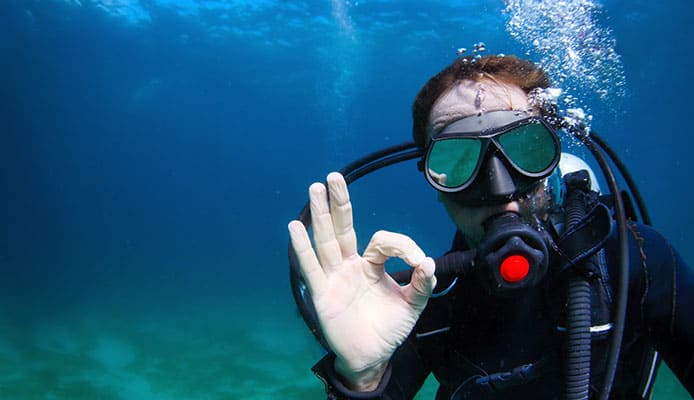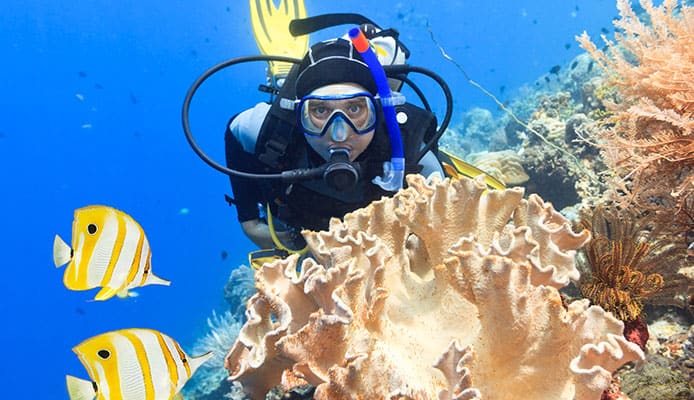
Scuba diving is one of the main fun summertime adventures anyone could participate in. In this modern era where looking at phone and computer screens is a part of our everyday life, the number of divers with some kind of eye problem is on the rise, so the questions of whether diving with glasses is possible and how to practice safe scuba diving with contact lenses are widespread.
In this article we’ll answer these two questions and talk about some other things related to scuba diving with glasses, so when the time comes to put your scuba diving gear to use you know what to expect and how to behave.
Seeing Under Water Surface
It is important to know what you should be able to see while you dive. Sometimes the water may not be clear enough to see too far away, but scuba divers should always be able to clearly see submersible pressure gauge readings or the other scuba diver’s hand signals. If the problem occurs with either, it is recommended to visit a doctor and finding a way to correct eye vision. Most of the time one of the two options will work – prescription mask or soft contact lenses.
Water May Correct The Issue
You probably know that, when you place an object into the water, it appears somewhere about 1/3 larger and closer than it really is. This happens because of the magnifying water properties and it is one of the main things divers learn during their scuba diving course. So, if you have a slight eyesight problem, there is a possibility that the water will help and you actually may not need anything during your diving session.
Helping Aid Options
In case you do need some kind of assistance, there are a few different options you could use to keep your eyesight sharp.
Eyeglasses
Although it may sound like a simple solution, wearing eyeglasses under your scuba diving mask most likely is not an option. The reason why the glasses will not work lies in earpieces. They most likely won’t allow the mask to completely seal, and if it does seal properly, the pressure of the scuba mask on the nose piece and the lenses of the glasses will make them feel awkward on your face. That’s why most scuba divers decide to skip eyeglasses and get something else, like prescription masks.
Prescription Masks
Nowadays many scuba diving gear companies have scuba diving masks with prescription lenses. If you own a non-prescription mask, you may be able just to replace the original lenses with prescription ones. Although, there are some things you should always have on your mind if you decide to go with a prescription mask:
- They do not replace your glasses. If you want to see clearly after your dive, you’ll need your regular glasses before and after your session.
- Go double – it is recommended to get an extra prescription mask to serve you as a backup. Most scuba diving places don’t have adequate masks, so if you somehow lose your mask or something happens with it and you don’t have a substitute, your fun under the surface may be over.
Contact Lenses
Unlike glasses, contact lenses will let everything fit perfectly, but not all of them are a good option for scuba diving. Soft contact lenses will probably not cause you any problems during your dive. On the other hand, hard contact lenses or gas permeable contact lenses could make your diving with contact lenses a living hell.
During your dive the deeper you go the bigger the pressure will be. This means that the lenses will get pressured to your eyes and they could cause pain by pressing your eyeballs. The second thing that could happen is blurry vision caused by the air bubbles trapped between the lens and the eye.
Also, you should always have contact lens re-wetting drops within a hand reach at your dive site. Although this rarely happens, the contact lenses could become stuck due to the increased pressure under the surface, so you’ll need re-wetting drops to fix this.
Can You Dive After Eye Surgery?
The short answer is simple – most of the time, yes, you will be able to dive after eye surgery. But, before you decide to dip your eyes, there are some actions you should do to keep it safe and fun.
- Let your eyes heal fully. Don’t rush anything! Your eyes have to completely recover from the surgery before you head back into the water. There is no specific timetable for your return, the waiting time may vary from procedure to procedure, and we don’t have to mention how important a doctor’s follow-up is. When you get a green light, that’s all you need. If you’ve had laser surgery, you should be back in action in a no-time.
- In case of any procedure that involves cutting the eye or if the condition was serious, like glaucoma, the eye strength may be lowered, so it is important to get the doctor’s permission. If the doctor says you should wait – do it. By rushing things you could only make your condition worse and separate yourself from scuba diving for a longer period of time.
You might also like: Scuba Diving With A Cold
Bifocal Options
There may not be many manufacturers that create bifocal scuba diving mask lenses, but the solution is rather simple. Check for the stick-on magnifying lenses made for scuba masks. Just place these small lenses at the bottom of your scuba diving mask lens and you’ll get a bifocal mask.
Globo Surf Overview
So, is it possible to go scuba diving if you have problems with your eyesight? Yes, it is. The best option for you is prescription scuba diving masks, although you may also go with soft contact lenses. Glasses, hard contact lenses, and gas contact lenses may not be suitable as they could react badly to increased pressure and cause you discomfort.
Just to stay safe and be able to fully enjoy the underwater wonders, make sure you visit your doctor and do an eye exam. It will save you a lot of nerves, prevent any possible problem and you’ll be able to concentrate on your diving, instead of having to worry about any eye-related complications.


